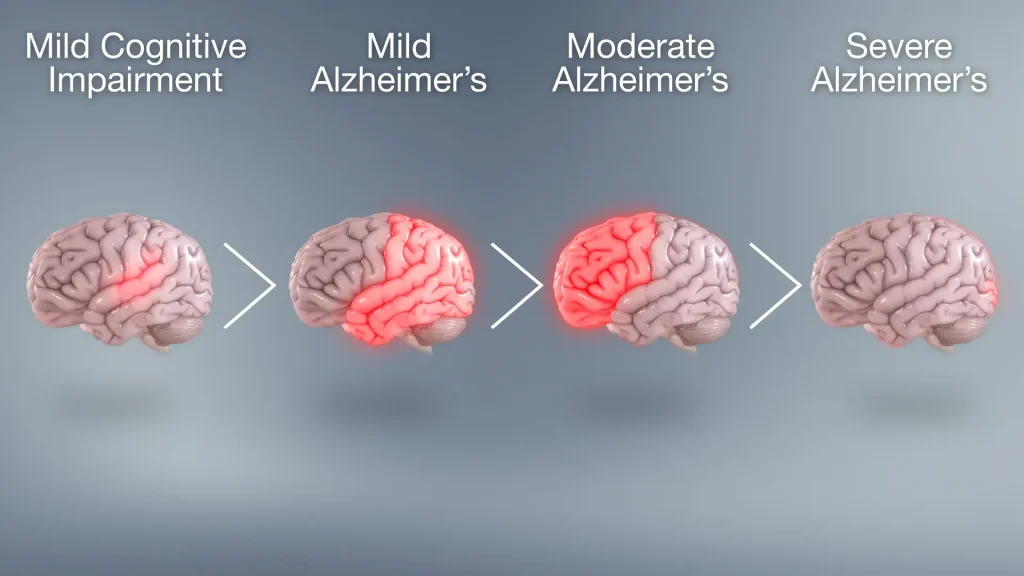Alzheimer’s disease currently impacts millions of individuals and families across the United States, with over seven million reported cases. Many Americans express a desire for early detection of Alzheimer’s, longing to understand if they might develop the illness even before its daunting symptoms become apparent. Recent advancements in testing, including the innovative Alzheimer’s blood test, are paving the way for a shift in attitudes, fostering openness about the condition. As the public’s awareness grows, so does the challenging reality of Alzheimer’s caregiving costs, which are projected to soar to $384 billion by 2025. Engaging in Alzheimer’s prevention strategies, such as healthy eating and exercise, can help individuals take proactive steps in fighting this pervasive disease.
Dementia, particularly the form known as Alzheimer’s, represents a significant health challenge for many individuals aged 65 and older. This progressive brain disorder affects memory, thinking, and behavior, and the need for early detection is more critical than ever. Awareness surrounding symptoms related to dementia can lead to timely interventions and better management of the disease. With the mounting pressures of caregiving for those afflicted, understanding the costs and psychological impact is essential for families. Exploring various prevention strategies can empower individuals to reduce their risk while nurturing their cognitive health.
Understanding Alzheimer’s Disease and Its Prevalence
Alzheimer’s disease is a progressive neurological disorder that affects millions across the globe, with more than seven million individuals currently impacted in the U.S. alone. This staggering statistic underscores the importance of increased awareness and understanding surrounding this condition. The Alzheimer’s Association emphasizes that nearly four out of five Americans would prefer to know if they are at risk for Alzheimer’s before symptoms manifest. This shift in attitude reflects a growing desire for transparency and proactive health management among the population.
Early detection of Alzheimer’s is often complicated by the challenge of distinguishing between normal age-related cognitive decline and the early signs of dementia. Many individuals may experience confusion regarding these symptoms and may not seek necessary evaluations. As research advances, more efficient strategies for detecting Alzheimer’s earlier are becoming vital in managing not just the disease but also the emotional and financial burden it places on families and the healthcare system.
The Role of Blood Tests in Alzheimer’s Detection
Recent advancements in medical technology have led to the development of blood tests that can predict the likelihood of an individual developing Alzheimer’s disease. This innovative approach significantly reduces the intimidation factor often associated with traditional diagnostic methods, which include invasive procedures such as PET scans and spinal taps. With early detection being crucial for effective intervention and management, these blood tests could revolutionize how we approach Alzheimer’s, enabling patients and families to make informed decisions.
By identifying Alzheimer’s disease in its early stages, individuals can access preventive care and lifestyle modifications that may mitigate the disease’s progression. The insight gained from these blood tests can empower individuals to alter their daily habits, potentially leading to better health outcomes. It is vital for healthcare providers to educate patients about the availability and implications of these tests, allowing for a more proactive approach to Alzheimer’s disease management.
Alzheimer’s Caregiving Costs and Impact on Families
The emotional and financial impact of Alzheimer’s on families cannot be overstated. The national estimation that caregiving costs will rise to $384 billion by 2025 conveys the mounting responsibility shouldered by family members and friends. Nearly 12 million unpaid caregivers are currently managing the burden of Alzheimer’s care, which equates to more than 19.2 billion hours of unpaid labor valued at over $413 billion. This staggering figure highlights the importance of supporting caregivers to ensure they receive adequate resources and respite.
As the demand for Alzheimer’s care continues to grow, innovations in caregiving strategies and financial support systems are crucial. Caregiving costs significantly influence the quality of life for both patients and their caregivers, leading to a pressing need for community and government resources. Prioritizing caregiver support can ease the emotional and financial strains experienced by families and encourage a healthier caregiving environment.
Recognizing the Symptoms of Alzheimer’s Disease
Identifying the early symptoms of Alzheimer’s disease is essential for timely diagnosis and intervention. Common signs include memory loss, difficulty in completing familiar tasks, and challenges in problem-solving. Recognizing these symptoms early can dramatically influence an individual’s journey through the disease. Yet, many individuals struggle to discern between normal aging and cognitive decline indicative of Alzheimer’s, often waiting too long to seek help from healthcare professionals.
Increased awareness about the symptoms of Alzheimer’s is crucial for earlier diagnosis and management. Public campaigns and educational programs play a key role in removing stigma and encouraging open conversations about cognitive health. Understanding the nuances of Alzheimer’s symptoms helps individuals and families navigate the complexities of this disease and seek appropriate support and care.
Strategies for Alzheimer’s Disease Prevention
Implementing effective Alzheimer’s prevention strategies can significantly lower the risk of developing the disease. Experts suggest that lifestyle modifications such as adhering to a Mediterranean diet rich in fruits and vegetables, engaging in regular physical exercise, and managing chronic conditions effectively contribute to enhanced brain health. These simple yet impactful changes can make a difference in preventing Alzheimer’s, offering individuals more control over their health outcomes.
Additionally, researchers continue to explore new potential interventions, emphasizing the importance of holistic approaches to Alzheimer’s prevention. Community initiatives aimed at promoting physical activity, cognitive engagement, and social interaction are critical for fostering a supportive environment that enhances overall well-being and reduces the risk of cognitive decline. By educating the public on effective prevention strategies, we can empower individuals to take proactive steps toward maintaining their cognitive health.
The Future of Alzheimer’s Treatment Options
The landscape of Alzheimer’s treatment options is evolving, with over 140 new therapies currently under development. This burgeoning exploration into novel treatments offers hope to individuals and families affected by the disease, suggesting that advancements in medical science may soon lead to more effective management strategies. As awareness of Alzheimer’s grows, this creates an optimistic outlook for those impacted by the disease.
As researchers continue to investigate effective interventions, it is critical for the public to stay informed about emerging treatment options. Awareness of available resources and advancements in Alzheimer’s research empowers patients to engage in discussions with their healthcare providers regarding potential treatment pathways. With more avenues for exploration, the future of Alzheimer’s care is becoming increasingly hopeful.
Challenges in Early Detection of Alzheimer’s
Identifying Alzheimer’s during its early phases presents numerous challenges, notably distinguishing its symptoms from common age-related cognitive changes. Individuals often experience uncertainty about whether their cognitive issues warrant further examination, leading to potential delays in diagnosis. The integration of new technologies into medical practice aims to reduce these uncertainties, yet educating the public about the importance of early detection remains paramount.
The evolving approaches to Alzheimer’s diagnosis may help overcome traditional barriers, yet advocates stress the need for ongoing public education. Awareness campaigns focusing on Alzheimer’s disease, its symptoms, and the significance of early detection can encourage individuals to pursue medical consultations sooner. This increased vigilance can lead to better health outcomes and enhanced quality of life for individuals facing cognitive decline.
The Importance of Community Support for Alzheimer’s Care
Community support plays a crucial role in addressing the multifaceted challenges associated with Alzheimer’s caregiving. Local organizations, support groups, and healthcare providers can create networks that empower caregivers and offer them the resources necessary to manage their responsibilities effectively. This support is vital for helping caregivers cope with stress, fostering resilience, and ensuring their well-being.
By facilitating connections among caregivers, communities can create platforms for sharing experiences and strategies to navigate care challenges. Workshops, seminars, and community events focused on Alzheimer’s education not only bolster awareness but also provide valuable insights to help caregivers foster healthier environments for their loved ones. Advancing community support systems is integral to enhancing the experiences of both caregivers and individuals living with Alzheimer’s.
The Cost of Alzheimer’s Care: Understanding Financial Implications
The financial implications of Alzheimer’s care are significant, affecting families’ overall economic stability. With the expectation that national caregiving costs will escalate to $384 billion by 2025, families face increasing demands on their resources. Understanding these costs is essential, as families must plan for the potential financial burden imposed by long-term care and medical needs associated with Alzheimer’s.
Navigating the financial landscape of Alzheimer’s care can be daunting. Families may benefit from consulting with financial advisors or utilizing community resources designed to provide guidance on managing caregiving costs effectively. Awareness of available financial support, including government assistance programs, can alleviate some of the pressures families face, enabling them to focus more on providing quality care and support.
Raising Awareness about Alzheimer’s Disease
Raising awareness about Alzheimer’s disease is essential in combating the stigma often associated with cognitive decline and dementia. Public campaigns focused on education can help demystify the disease, encouraging individuals to discuss their concerns openly and seek timely evaluations. As more people understand the realities of Alzheimer’s, the dialogue surrounding the disease becomes less taboo, with individuals more willing to engage with health professionals about their cognitive health.
Awareness initiatives can also motivate families to approach Alzheimer’s proactively, fostering environments where early detection and intervention are prioritized. By promoting discussions surrounding the signs and symptoms of Alzheimer’s, we can encourage more individuals to seek medical advice early and become advocates for their health, ultimately improving overall outcomes.
Frequently Asked Questions
What are the early signs and symptoms of Alzheimer’s disease?
The symptoms of Alzheimer’s disease can vary but often include memory loss, difficulty with problem-solving, confusion with time or place, and changes in mood and personality. Early detection of Alzheimer’s is crucial, as identifying these symptoms early can lead to better management and care options.
How can early detection of Alzheimer’s disease be achieved?
Early detection of Alzheimer’s can now be achieved through advanced testing methods, including a new Alzheimer’s blood test that can predict the likelihood of developing the disease before symptoms appear. This test is less invasive and less intimidating compared to traditional methods like PET scans and spinal taps.
What is the significance of the Alzheimer’s blood test in the context of the disease?
The Alzheimer’s blood test is significant because it allows for the early detection of Alzheimer’s disease, providing individuals with an opportunity to plan and take preventive actions before symptoms emerge. Awareness of potential risks can lead to better preparation and care strategies.
What are some Alzheimer’s prevention strategies that can be helpful?
Alzheimer’s prevention strategies include maintaining a healthy diet rich in fruits and vegetables, adhering to the Mediterranean diet, engaging in regular physical exercise, and managing chronic conditions such as high blood pressure. These lifestyle changes can potentially lower the risk of developing Alzheimer’s disease.
What are the costs associated with Alzheimer’s caregiving?
The costs associated with Alzheimer’s caregiving are substantial. By 2025, the national cost of care for individuals with Alzheimer’s and other dementias is expected to reach $384 billion. Additionally, caregivers provide nearly 19.2 billion hours of unpaid care, highlighting the significant financial and emotional burden on families.
Why is there an increasing demand for transparency in Alzheimer’s disease detection?
The increasing demand for transparency in Alzheimer’s disease detection stems from both the desire for early diagnosis and the rising costs associated with caregiving for Alzheimer’s patients. Knowing one’s risk allows individuals to make informed choices regarding their health and care options.
How does the aging population affect Alzheimer’s disease prevalence?
The aging population significantly affects the prevalence of Alzheimer’s disease, with an increasing number of individuals at risk as they age. This demographic shift underscores the importance of continued research and development of treatment options for Alzheimer’s.
| Key Point | Details |
|---|---|
| Prevalence | Alzheimer’s disease affects over 7 million people in the U.S. |
| Public Awareness | Nearly 80% of Americans want to know if they have Alzheimer’s before symptoms appear. |
| Stigma Shift | Advancements in technology are changing perceptions around early testing. |
| Diagnostic Innovations | New blood tests are being developed to predict Alzheimer’s risk without invasive procedures. |
| Cost of Care | Caregiving costs related to Alzheimer’s are expected to reach $384 billion by 2025. |
| Lifestyle Impact | Healthy diets and exercise can lower the risk of Alzheimer’s. |
| Optimism in Treatment | Over 140 treatment options are currently in development. |
Summary
Alzheimer’s disease is a growing concern in the U.S., with over seven million individuals affected. The recent advancements in early detection and public awareness are changing how society views this disease. Increased willingness to know one’s status before symptoms arise reflects a shift in stigma and a demand for better diagnostic tools. Furthermore, the significant costs associated with caregiving highlight the urgent need for effective treatments and preventative measures. As research continues and optimism about new therapies rises, lifestyle changes offer promising strategies for reducing Alzheimer’s risk.



